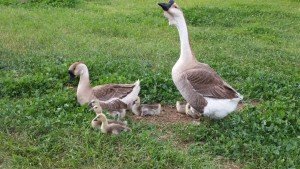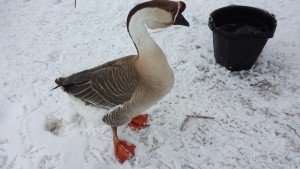For 2026, we are not selling African geese or goslings.
African Geese are on the Livestock Conservancy’s Priority List.
Guard Geese:
Guard geese are domesticated geese used as guard animals for farms and personal land. African geese have a large stature, loud voices, and they have territorial behavior, which makes them great guard animals. They are good at alarming their owners when something is amiss in their environment. Their loud honking will alert nearby humans when the geese are stressed.
Geese as a species are not unpleasant aggressive creatures; however, they are protective of their home and family. Like any animal, their behavior is all to do with how you train them to be. Our African adult geese do not harm or chase us, nor do they hurt family members or friends, but they will honk or hiss at strangers, and they do sound the alarm for predators.
At Wild Acres, we hatch all our African goose eggs in small batches and hand-raise the goslings. Therefore, our goslings imprint on humans and form a special bond with us, and greet us with enthusiasm when they see us.
“Lorenz found that geese follow the first moving object they see. This process is known as imprinting and suggests that attachment is innate and programmed genetically. Lorenz believed that once imprinting has occurred, it cannot be reversed, nor can a gosling imprint on anything else.” Konrad Lorenz – Imprinting – Simply Psychology
When we go for a walk in the field or tend to our chores our geese will happily greet us. It makes this type of waterfowl one of the most satisfying to own, creating a special bond as strong as a dog or other household pet.
Our geese are the alpha birds with our mixed flock of ducks, turkeys, and chickens that roam our main field. They all live together in an enclosed coop and pen area without issue at night when we lock them up.
Our geese, turkeys, and roosters are wary of predators. We have seen our geese and turkeys chase away stray cats and crows if they get too close. Our geese also sound the alarm when eagles, hawks, or owls fly overhead.
All geese form very strong bonds with their mates and seek each other out for companionship. A goose should not be kept as a lone watch dog and they cannot take the place of a livestock guardian dog. We sell our goslings in pairs or larger groupings. We do not sell them individually as they become lonely without other family members. Some may sacrifice themselves to protect their flock or mate, but their greatest attribute is their loud-honking voice alarm system.
https://www.facebook.com/wildacres.ca/
Our matriarch pair of African geese did well at the Interior Provincial Exhibition 2016. We won Champion goose!
Waterfowl are less prone to most common poultry diseases and parasites and are very hardy in cold and wet weather. Our waterfowl flock free ranges daily through-out the year. They are healthy and long-lived birds.
History of the African Goose
The African goose originated from the wild Asian Swan Goose of China. African geese are also quite a bit heavier than Chinese and are better known for their docile temperaments. They are beautiful geese and are very active foragers of grasses and weeds.
Raising Goslings
Good handling of all livestock requires quiet determination. Geese are large birds and must be handled carefully to avoid broken bones or dislocated joints. Give goslings a non-slip surface during the first week as they can suffer from spraddle legs if their legs go out to the side when they slip on a smooth surface. The brooder space for goslings should provide at least 1/2 square foot of floor space per bird at first, increasing to 1 square foot in two weeks.
Keep goslings dry until they have all their feathers and can maintain their body temperature. Place their waterer on a wire mesh, with a tray below to catch spilled water so that they cannot play in it. Goslings can start grazing at just a few weeks of age. Feed waterfowl starter crumbs or non-medicated chick crumbs (20% protein) for the first week. A pelleted grower ration (16%) and grit plus cracked corn, wheat, milo, oats, or other grain can be fed after this time. We also supplement the adult geese with free-choice oyster shells.
Goslings can be put outside in a small pen in the garden during the day after they are six weeks old if the weather is 21 degrees Celsius or above. At this age, they still need to be kept dry and out of a brisk wind and may still need to go back into the brooder on chilly nights.
Feeding Geese and Housing
Geese are more like grazing animals than any other type of poultry. Their beak and tongue are particularly well-equipped for grazing. Because geese have virtually no crop in which to hold feed, they tend to feed and graze frequently. In summer they may continue to graze and feed in the evening, but you should pen them up at night to keep predators at bay.
Geese are often housed with ducks and can be free-run with other poultry such as chickens as long as extra waterers are made available for the chickens. Hanging buckets with chicken nipples work well for both poultry and waterfowl. However, typical chicken waterers aren’t deep enough for waterfowl. To keep their nostrils and eyes clean, they need to be able to dunk their entire head into the water.
During the summer months, if they have an extensive range, they may eat little else but grass, but during the autumn and winter months when the protein content of grass is lower, they will need wheat and pellets. We supply our geese and ducks with wheat, pellets, grit, and oyster shells year-round.
Always ensure there is clean drinking water available near their food. We periodically add some apple cider vinegar to the waterers to disinfect them, kill germs and or algae, and aid the digestive systems of our waterfowl. Do not add apple cider vinegar to metal waterers or they will rust.
Geese don’t require expensive accommodation. A shed will do, providing it has ventilation. We also lock our waterfowl up in an enclosed pen at night with wind protection to protect them from predators.
Domestic geese do not need a pond (they only spend around 10% of their time on water) and a large rubber tub is enough for them to be content. However, geese prefer to mate on water so to ensure the heavier breeds are successful with this, they may need a slightly deeper water source such as a kiddie pool.
Health and Mating
African geese are long-lived and will produce for many years under normal circumstances. Geese don’t generally fall ill if they are kept correctly, so other than routine worming, they don’t require much in the way of medication.
African geese may or may not have a dewlap. The dewlap is slow to develop in some birds, taking 12 to 36 months to develop fully. The mature African goose has a large knob attached to its forehead, which requires several years to develop. Ganders are taller with a more pronounced dewlap, while the females are shorter and stockier, with larger keels or lobes.
Geese form strong bonds with their mates, and they should not be kept alone. Large breeds of geese generally mate best in pairs and trios. Males usually mate with the same female(s) year after year. So having more than one female is advantageous, in case one is lost.
If well managed, they will lay eggs in their first year, but their eggs are more fertile in their second year when they fully mature. They may lay 20-30 extra-large white eggs (5-8oz) sporadically over the spring and summer months. These eggs take up to 30-32 days to hatch. The African goose produces high-quality, lean meat, and is considered a premier roasting goose.
Status: weeders, pets, watchdogs, meat
APA Standard Weight: ganders 16-20 lbs. at maturity
Please remember that prolonged feeding of high amounts of protein such as 20% chick starter and or 25% turkey starter can result in Angel wing, which is the result of a diet too high in protein. The last joint of the wing is twisted with the wing feathers pointing out laterally, instead of lying against the body. We suggest taking away high protein food sources at night.
If your gosling or duck develops Angel Wing there is hope. If caught at a young age and the feeding is changed such as adding more greens and low protein grains. Angel wing may be corrected. The affected wing can be tucked under and taped with surgical tape. The surgical tape usually falls off by itself within a few days.












